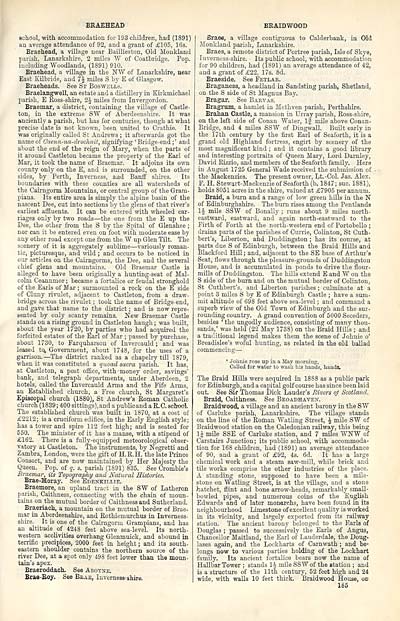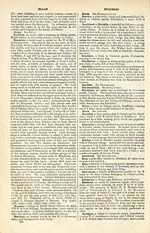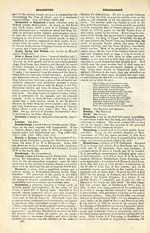Ordnance gazetteer of Scotland
(193) Page 185
Download files
Complete book:
Individual page:
Thumbnail gallery: Grid view | List view

BEAEHEAD
school, with accommodation for 193 children, had (1891)
an average attendance of 92, and a grant of £105, 16s.
Braehead, a village near Baillieston, Old Monkland
parish, Lanarkshire, 2 miles W of Coatbridge. Pop.
including Woodlands, (1891) 910.
Braehead, a village in the NW of Lanarkshire, near
East Kilbride, and 7J miles S by E of Glasgow.
Braeheads. See St Boswells.
Braelangwell, an estate and a distillery in Kirkmichael
parish, E Ross-shire, 2J miles from Invergordon.
Braemar, a district, containing the village of Castle-
ton, in the extreme SW of Aberdeenshire. It was
anciently a parish, but has for centuries, though at what
precise date is not known, been united to Crathie. It
was originally called St Andrews ; it afterwards got the
name of C'aenn-na-drochait, signifying ' Bridge-end ; ' and
about the end of the reign of Mary, when the parts of
it around Castleton became the property of the Earl of
Mar, it took the name of Braemar. It adjoins its own
county only on the E, and is surrounded, on the other
sides, by Perth, Inverness, and Banff shires. Its
boundaries with these counties are all watersheds of
the Cairngorm Mountains, or central group of the Gram-
pians. Its entire area is simply the alpine basin of the
nascent Dee, cut into sections by the glens of that river's
earliest affluents. It can he entered with wheeled car-
riages only by two roads — the one from the E up the
Dee, the other from the S by the Spital of Glenshee ;
nor can it be entered even on foot with moderate ease by
any other road except one from the W up Glen Tilt. The
scenery of it is aggregately sublime — variously roman-
tic, picturesque, and wild ; and occurs to be noticed in
our articles on the Cairngorms, the Dee, and the several
chief glens and mountains. Old Braemar Castle is
alleged to have been originally a hunting-seat of Mal-
colm Ceannmor ; became a fortalice or feudal stronghold
of the Earls of Mar ; surmounted a rock on the E side
of Cluny rivulet, adjacent to Castleton, from a draw-
bridge across the rivulet ; took the name of Bridge-end,
and gave that name to the district ; and is now repre-
sented by only scanty remains. New Braemar Castle
stands on a rising ground in Castleton haugh ; was built,
about the year 1720, by parties who had acquired the
forfeited estates of the Earl of Mar ; passed by purchase,
about 1730, to Farquharson of Invercauld ; and was
leased to. Government, about 1748, for the uses of a
garrison. — The district ranked as a chapelry till 1879,
when it was constituted a quoad sacra parish. It has,
at Castleton, a post office, with money order, savings'
bank, and telegraph departments, under Aberdeen, 2
hotels, called the Invercauld Arms and the Fife Arms,
an Established church, a Free church, St Margaret's
Episcopal church (1880), St Andrew's Roman Catholic
church (1839 ; 400 sittings), and a publicand a B.C. school.
The established church was built in 1870, at a cost of
£2212; is a cruciform edifice, in the Early English style;
has a tower and spire 112 feet high; and is seated for
550. The minister of it has a manse, with a stipend of
£162. There is a fully-equipped meteorological obser-
vatory at Castleton. The instruments, by Negretti and
Zambra, London, were the gift of H.R.H. the late Prince
Consort, and are now maintained by Her Majesty the
Queen. Pop. of q. s. parish (1891) 835. See Crombie's
Braemar, its Topography and Natural Histories.
Brae-Moray. See Edenkillie.
Braemore, an upland tract in the SW of Latheron
parish, Caithness, connecting with the chain of moun-
tains on the mutual border of Caithness and Sutherland.
Braeriach, a mountain on the mutual border of Brae-
mar in Aberdeenshire, and Rothiemurchus in Inverness-
shire. It is one of the Cairngorm Grampians, and has
an altitude of 4248 feet above sea-level. Its north-
western acclivities overhang Glenmuick, and abound in
terrific precipices, 2000 feet in height ; and its south-
eastern shoulder contains the northern source of the
river Dee, at a spot only 498 feet lower than the moun-
tain's apex.
Braeroddach, See Abotue.
Brae-Eoy. See Brae, Inverness-shire.
BEAIDWOOD
Braee, a village contiguous to Calderbank, in Old
Monkland parish, Lanarkshire.
Braes, a remote district of Portree parish, Isle of Skye,
Inverness-shire. Its public school, with accommodation
for 90 children, had (1891) an average attendance of 42,
and a grant of £22, 17s. 8d.
Braeside. See Fetlar.
Braganess, a headland in Sandsting parish, Shetland,
on the S side of St Magnus Bay.
Bragar. See Barvas.
Bragrum, a hamlet in Methven parish, Perthshire.
Brahan Castle, a mansion in Urray parish, Ross-shire,
on the left side of Conan Water, If mile above Conan-
Bridge, and 4 miles SSW of Dingwall. Built early in
the 17th century by the first Earl of Seaforth, it is a
grand old Highland fortress, engirt by scenery of the
most magnificent kind ; and it contains a good library
and interesting portraits of Queen Mary, Lord Darnley,
David Rizzio, and members of the Seaforth family. Here
in August 1725 General Wade received the submission of
the Mackenzies. The present owner, Lt.-Col. Jas. Alex.
F. H. Stewart-Mackenzie of Seaforth (b. 1847; sue. 1881),
holds 8051 acres in the shire, valued at £7905 per annum.
Braid, a burn and a range of low green hills in the N
of Edinburghshire. The burn rises among the Pentlands
li mile SSW of Bonally ; runs about 9 miles north-
eastward, eastward, and again north-eastward to the
Firth of Forth at the north-western end of Portobello ;
drains parts of the parishes of Currie, Colinton, St Cuth-
bert's, Liberton, and Duddingston ; has its course, at
parts due S of Edinburgh, between the Braid Hills and
Blackford Hill; and, adjacent to the SE base of Arthur's
Seat, flows through the pleasure-grounds of Duddingston
House, and is accumulated in ponds to drive the flour-
mills of Duddingston. The hills extend E and W on the
S side of the burn and on the mutual border of Colinton,
St Cuthbert's, and Liberton parishes ; culminate at a
point 3 miles S by E of Edinburgh Castle ; have a sum-
mit altitude of 698 feet above sea-level ; and command a
superb view of the Old Town of Edinburgh and the sur-
rounding country. A grand convention of 5000 Seceders,
besides ' the ungodly audience, consisting of many thou-
sands,' was held (22 May 1738) on the Braid Hills ; and
a traditional legend makes them the scene of Johnie o'
Breadislee's woful hunting, as related in the old ballad
commencing —
' Johnie rose up in a May morning,
Called for water to wash his hands, hands.
The Braid Hills were acquired in 1888 as a public park
for Edinburgh, and a capital golf course has since been laid
out. See Sir Thomas Dick Lauder's Pavers oj Scotland.
Braid, Caithness. See Beoadhaven.
Braidwood!, a village and an ancient barony in the SW
of Carluke parish, Lanarkshire. The village stands
on the line of the Roman Watling Street, £ mile SW of
Braidwood station on the Caledonian railway, this being
1J mile SSE of Carluke station, and 7 miles WNW of
Carstairs Junction; its public school, with accommoda-
tion for 168 children, had (1891) an average attendance
of 90, and a grant of £92, 4s. 6d. It has a large
chemical work and a steam saw-mill, while brick and
tile works comprise the other industries of the place.
A standing stone, supposed to have been a mile-
stone on Watling Street, is at the village, and a stone
hatchet, flint and bone arrow-heads, remarkably small-
bowled pipes, and numerous coins of the English
Edwards and of later monarchs, have been found in its
neighbourhood Limestone of excellent quality is worked
in its vicinity, and largely exported from its railway
station. The ancient barony belonged to the Earls of
Douglas ; passed to successively the Earls of Angus,
Chancellor Maitland, the Earl of Lauderdale, the Doug-
lases again, and the Lockharts of Carnwath ; and be-
longs now to various parties holding of the Lockhart
family. Its ancient fortalice bears now the name of
Hallbar Tower ; stands 1^ mile SSW of the station ; and
is a structure of the 11th century, 52 feet high and 24
wide, with walls 10 feet thick. Braidwood House, on
185
school, with accommodation for 193 children, had (1891)
an average attendance of 92, and a grant of £105, 16s.
Braehead, a village near Baillieston, Old Monkland
parish, Lanarkshire, 2 miles W of Coatbridge. Pop.
including Woodlands, (1891) 910.
Braehead, a village in the NW of Lanarkshire, near
East Kilbride, and 7J miles S by E of Glasgow.
Braeheads. See St Boswells.
Braelangwell, an estate and a distillery in Kirkmichael
parish, E Ross-shire, 2J miles from Invergordon.
Braemar, a district, containing the village of Castle-
ton, in the extreme SW of Aberdeenshire. It was
anciently a parish, but has for centuries, though at what
precise date is not known, been united to Crathie. It
was originally called St Andrews ; it afterwards got the
name of C'aenn-na-drochait, signifying ' Bridge-end ; ' and
about the end of the reign of Mary, when the parts of
it around Castleton became the property of the Earl of
Mar, it took the name of Braemar. It adjoins its own
county only on the E, and is surrounded, on the other
sides, by Perth, Inverness, and Banff shires. Its
boundaries with these counties are all watersheds of
the Cairngorm Mountains, or central group of the Gram-
pians. Its entire area is simply the alpine basin of the
nascent Dee, cut into sections by the glens of that river's
earliest affluents. It can he entered with wheeled car-
riages only by two roads — the one from the E up the
Dee, the other from the S by the Spital of Glenshee ;
nor can it be entered even on foot with moderate ease by
any other road except one from the W up Glen Tilt. The
scenery of it is aggregately sublime — variously roman-
tic, picturesque, and wild ; and occurs to be noticed in
our articles on the Cairngorms, the Dee, and the several
chief glens and mountains. Old Braemar Castle is
alleged to have been originally a hunting-seat of Mal-
colm Ceannmor ; became a fortalice or feudal stronghold
of the Earls of Mar ; surmounted a rock on the E side
of Cluny rivulet, adjacent to Castleton, from a draw-
bridge across the rivulet ; took the name of Bridge-end,
and gave that name to the district ; and is now repre-
sented by only scanty remains. New Braemar Castle
stands on a rising ground in Castleton haugh ; was built,
about the year 1720, by parties who had acquired the
forfeited estates of the Earl of Mar ; passed by purchase,
about 1730, to Farquharson of Invercauld ; and was
leased to. Government, about 1748, for the uses of a
garrison. — The district ranked as a chapelry till 1879,
when it was constituted a quoad sacra parish. It has,
at Castleton, a post office, with money order, savings'
bank, and telegraph departments, under Aberdeen, 2
hotels, called the Invercauld Arms and the Fife Arms,
an Established church, a Free church, St Margaret's
Episcopal church (1880), St Andrew's Roman Catholic
church (1839 ; 400 sittings), and a publicand a B.C. school.
The established church was built in 1870, at a cost of
£2212; is a cruciform edifice, in the Early English style;
has a tower and spire 112 feet high; and is seated for
550. The minister of it has a manse, with a stipend of
£162. There is a fully-equipped meteorological obser-
vatory at Castleton. The instruments, by Negretti and
Zambra, London, were the gift of H.R.H. the late Prince
Consort, and are now maintained by Her Majesty the
Queen. Pop. of q. s. parish (1891) 835. See Crombie's
Braemar, its Topography and Natural Histories.
Brae-Moray. See Edenkillie.
Braemore, an upland tract in the SW of Latheron
parish, Caithness, connecting with the chain of moun-
tains on the mutual border of Caithness and Sutherland.
Braeriach, a mountain on the mutual border of Brae-
mar in Aberdeenshire, and Rothiemurchus in Inverness-
shire. It is one of the Cairngorm Grampians, and has
an altitude of 4248 feet above sea-level. Its north-
western acclivities overhang Glenmuick, and abound in
terrific precipices, 2000 feet in height ; and its south-
eastern shoulder contains the northern source of the
river Dee, at a spot only 498 feet lower than the moun-
tain's apex.
Braeroddach, See Abotue.
Brae-Eoy. See Brae, Inverness-shire.
BEAIDWOOD
Braee, a village contiguous to Calderbank, in Old
Monkland parish, Lanarkshire.
Braes, a remote district of Portree parish, Isle of Skye,
Inverness-shire. Its public school, with accommodation
for 90 children, had (1891) an average attendance of 42,
and a grant of £22, 17s. 8d.
Braeside. See Fetlar.
Braganess, a headland in Sandsting parish, Shetland,
on the S side of St Magnus Bay.
Bragar. See Barvas.
Bragrum, a hamlet in Methven parish, Perthshire.
Brahan Castle, a mansion in Urray parish, Ross-shire,
on the left side of Conan Water, If mile above Conan-
Bridge, and 4 miles SSW of Dingwall. Built early in
the 17th century by the first Earl of Seaforth, it is a
grand old Highland fortress, engirt by scenery of the
most magnificent kind ; and it contains a good library
and interesting portraits of Queen Mary, Lord Darnley,
David Rizzio, and members of the Seaforth family. Here
in August 1725 General Wade received the submission of
the Mackenzies. The present owner, Lt.-Col. Jas. Alex.
F. H. Stewart-Mackenzie of Seaforth (b. 1847; sue. 1881),
holds 8051 acres in the shire, valued at £7905 per annum.
Braid, a burn and a range of low green hills in the N
of Edinburghshire. The burn rises among the Pentlands
li mile SSW of Bonally ; runs about 9 miles north-
eastward, eastward, and again north-eastward to the
Firth of Forth at the north-western end of Portobello ;
drains parts of the parishes of Currie, Colinton, St Cuth-
bert's, Liberton, and Duddingston ; has its course, at
parts due S of Edinburgh, between the Braid Hills and
Blackford Hill; and, adjacent to the SE base of Arthur's
Seat, flows through the pleasure-grounds of Duddingston
House, and is accumulated in ponds to drive the flour-
mills of Duddingston. The hills extend E and W on the
S side of the burn and on the mutual border of Colinton,
St Cuthbert's, and Liberton parishes ; culminate at a
point 3 miles S by E of Edinburgh Castle ; have a sum-
mit altitude of 698 feet above sea-level ; and command a
superb view of the Old Town of Edinburgh and the sur-
rounding country. A grand convention of 5000 Seceders,
besides ' the ungodly audience, consisting of many thou-
sands,' was held (22 May 1738) on the Braid Hills ; and
a traditional legend makes them the scene of Johnie o'
Breadislee's woful hunting, as related in the old ballad
commencing —
' Johnie rose up in a May morning,
Called for water to wash his hands, hands.
The Braid Hills were acquired in 1888 as a public park
for Edinburgh, and a capital golf course has since been laid
out. See Sir Thomas Dick Lauder's Pavers oj Scotland.
Braid, Caithness. See Beoadhaven.
Braidwood!, a village and an ancient barony in the SW
of Carluke parish, Lanarkshire. The village stands
on the line of the Roman Watling Street, £ mile SW of
Braidwood station on the Caledonian railway, this being
1J mile SSE of Carluke station, and 7 miles WNW of
Carstairs Junction; its public school, with accommoda-
tion for 168 children, had (1891) an average attendance
of 90, and a grant of £92, 4s. 6d. It has a large
chemical work and a steam saw-mill, while brick and
tile works comprise the other industries of the place.
A standing stone, supposed to have been a mile-
stone on Watling Street, is at the village, and a stone
hatchet, flint and bone arrow-heads, remarkably small-
bowled pipes, and numerous coins of the English
Edwards and of later monarchs, have been found in its
neighbourhood Limestone of excellent quality is worked
in its vicinity, and largely exported from its railway
station. The ancient barony belonged to the Earls of
Douglas ; passed to successively the Earls of Angus,
Chancellor Maitland, the Earl of Lauderdale, the Doug-
lases again, and the Lockharts of Carnwath ; and be-
longs now to various parties holding of the Lockhart
family. Its ancient fortalice bears now the name of
Hallbar Tower ; stands 1^ mile SSW of the station ; and
is a structure of the 11th century, 52 feet high and 24
wide, with walls 10 feet thick. Braidwood House, on
185
Set display mode to: Large image | Transcription
Images and transcriptions on this page, including medium image downloads, may be used under the Creative Commons Attribution 4.0 International Licence unless otherwise stated. ![]()
| Gazetteers of Scotland, 1803-1901 > Ordnance gazetteer of Scotland > (193) Page 185 |
|---|
| Permanent URL | https://digital.nls.uk/97395562 |
|---|

